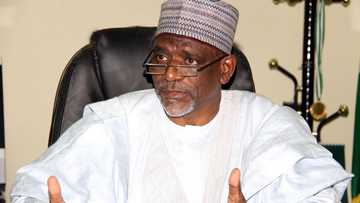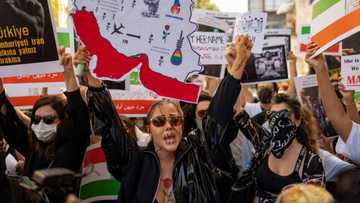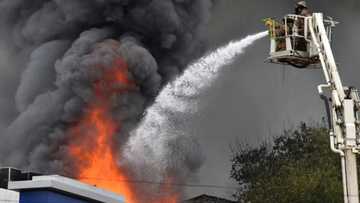BREAKING: Fear of Ebola Outbreak as NCDC Sends Strong Message to Nigerians, releases prevention guidelines
- Nigeria is now at high risk of importing the Ebola virus from Uganda, the Nigeria Centre for Disease Control (NCDC) has said
- The disease control agency made this known after a 24-year-old male exhibited symptoms of the disease, tested positive, and later died in Uganda
- Though there is no case of Ebola currently in Nigeria, the NCDC has released some preventive guidelines for Nigerians to follow
FCT, Abuja - The Nigeria Centre for Disease Control (NCDC) says Nigeria is at high risk of importing Ebola from Uganda.
This was contained in a press statement signed by the disease control agency's director general, Dr Ifedayo Adetifa, and released on Tuesday, October 4.

Source: Twitter
The NCDC said it was on high alert, adding that “the likelihood of importation of the disease to Nigeria is high due to the increased air travel between Nigeria and Uganda, especially through Kenya’s Nairobi airport, a regional transport hub, and other neighbouring countries that share a direct border with Uganda.”
Ebola outbreak in Uganda
Uganda had declared an outbreak of Ebola after a 24-year-old male exhibited symptoms of the disease, tested positive, and later died.
PAY ATTENTION: Сheck out news that is picked exactly for YOU ➡️ find the “Recommended for you” block on the home page and enjoy!
As of September 29, the Uganda ministry of health has reported 54 cases (35 confirmed and 19 probable) and 25 deaths (seven confirmed and 18 probable).
According to the NCDC, the ongoing outbreak of Ebola virus disease was caused by the Sudan strain of the Ebola virus in Uganda as declared on September 20, 2022.
Legit.ng gathers that the Ugandan Ministry of Health, with support from the WHO, is working to respond to and contain the spread of the virus effectively.
Ebola outbreak: Impact on health of Nigerians assessed as HIGH
The NCDC said available data indicates that the overall risk of importation of the Ebola virus and the impact on the health of Nigerians have been "assessed as HIGH", citing some reasons, which include:
“The Sudan Ebola Virus does not currently have an effective drug for treatment or licensed vaccine for prevention.
“The extent of the outbreak in Uganda has not yet been ascertained as investigations have shown that some persons may have died with similar symptoms which were not reported to health authorities. In addition, their burials were not conducted safely to prevent transmission.
“The case fatality rate of the Sudan virus varied from 41% to 100% in past outbreaks.
“The likelihood of spread in Nigeria following importation is high due to the gatherings and travel associated with politics, the coming yuletide as well as other religious gatherings and festivals during the last few months of the year.”
Ebola: Nigeria has capacity to deal with outbreak
Despite this risk assessment, the NCDC has given assurance that Nigeria has the capacity – technical, human (health workforce), and diagnostic – to respond effectively in the event of an outbreak.
The agency also noted that no case of Ebola virus has been reported in Nigeria as of Tuesday evening.
"Nonetheless, the Nigerian government through the NCDC’s multisectoral NEVHD TWG has put several measures in place to prevent and prepare for immediate control of any outbreak of the disease in-country,” the NCDC noted, adding that the Incident Coordination Centre is now in alert mode.
“Passengers arriving from Uganda and persons who transited in Uganda are being followed up for 21 days of their arrival in Nigeria on their health status.
“Trained Rapid Response Teams are on standby to be deployed in the event of an outbreak.
“Public Health Emergency Operations Centres in states with major points of entry, that is, Lagos, Kano, Abuja, and Rivers states are on standby. A medical countermeasures plan is available.
“Amplification of risk communication and engagement with states and partners to strengthen preparedness activities which include– a review of risk communication protocols, plans, and messages in the event of an outbreak,” the NCDC also stated.
Ebola outbreak: Steps Nigerians should take
Meanwhile, the NCDC has urged Nigerians to adhere strictly to the following preventive measures.
- Avoid non-essential travel to locations where the outbreak is reported for the moment.
- Avoid direct contact with blood, saliva, vomit, urine, and other bodily fluids of people with suspected or confirmed EVD.
- Call 6232 or other dedicated hotlines by State Ministries of Health to ensure all persons with suspected symptoms of EVD described above are promptly taken to designated healthcare facilities by the responsible State Ministry of Health for prompt diagnosis and initiation of supportive treatment
- In suspected and/or confirmed Ebola virus disease cases, direct physical contact should be avoided by ensuring strict isolation, the use of protective gowns, masks, gloves and safe disposal of needles, beddings, and other contaminated materials
- Safe burial practices are recommended for all cases of death from unknown causes, suspected to be Ebola virus or other viral haemorrhagic diseases
- The strict practice of standard infection prevention control practices in the healthcare setting for all suspected patients must be always adhered to.
WHO pushes two Ebola treatments found to boost survival rates
Earlier, Legit.ng reported that the World Health Organization said that two existing treatments dramatically reduced deaths from Ebola and should be given to people of all ages suffering from the often-fatal haemorrhagic disease.
Publishing its first-ever guidelines on which therapeutics to use against Ebola, the UN health agency strongly recommended using two monoclonal antibodies, mAb114, also known as Ansuvimab or Ebanga, and REGN-EB3, or Inmazeb.
Studies had shown that the two treatments significantly "reduced mortality," Janet Diaz, lead of the clinical management unit in the WHO's Health Emergencies programme, told reporters in Geneva.
Source: Legit.ng






